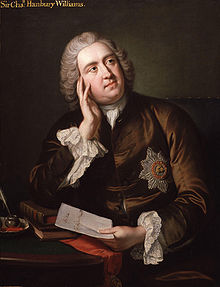- Charles Hanbury Williams
-
Sir Charles Hanbury Williams, KB (8 December 1708 – 2 November 1759), diplomat, writer and satirist, son of John Hanbury, a Welsh ironmaster, assumed the name of Williams on succeeding to the estate of his godfather Charles Williams, in 1720.
On 1 July 1732 at Saint James, Westminster, London, he married Lady Frances Coningsby (15 January 1707/1708 - buried at Westminster Abbey, Westminster, London, 31 December 1781), daughter of Thomas Coningsby, 1st Earl Coningsby and Lady Frances Jones. Their daughter Frances married William Capel, 4th Earl of Essex.
He entered the British Parliament in 1734 representing the Monmouthshire constituency as a supporter of Robert Walpole, and held the seat until 1747. Sir Charles then won the seat of Leominster in 1754 which he held until his death.
In 1739 he supported the establishment of the Foundling Hospital and served as one of its founding governors.
From 1747 till 1750, he was the British ambassador in Dresden. In 1748 he was in Poland and witnessed a Polish Sejm, where he met members of the influential Czartoryski family (August Aleksander Czartoryski). When the future King of Poland, Stanisław Poniatowski, was receiving medical treatment in Berlin, he met with Sir Charles, who was sent there as ambassador (1750–1751). The Englishman became part of Polish and Russian history by introducing Stanisław to the Russian Grand Duchess Catherine Alexeyevna (Saint Petersburg 1755) (the future Catherine the Great, Empress of Russia). From this moment on began the famous romance between Catherine and the Polish aristocrat.
Seven Years War
Further information: Great Britain in the Seven Years WarHe played a major role as a British envoy during the Seven Years War at the court in Russia. While Russia was at war with Britain's ally Prussia, the two countries remained at peace.
Sir Charles is recorded as a brilliant wit with a great reputation for lively and biting satire.
Legacy
He was the inspiration for the character Charles Edaston in the 1913 George Bernard Shaw play Great Catherine, which recounts the story of a British envoy to Catherine's court. It was made into a film starring Peter O'Toole in 1968.
Sources
This article incorporates text from a publication now in the public domain: Cousin, John William (1910). A Short Biographical Dictionary of English Literature. London, J. M. Dent & Sons; New York, E. P. Dutton.
Parliament of Great Britain Preceded by
John Hanbury
Thomas MorganMember of Parliament for Monmouthshire
with Thomas Morgan
1735–1747Succeeded by
William Morgan
Capel HanburyPreceded by
Robert de Cornwall
James PeacheyMember of Parliament for Leominster
with Richard Gorges
1754–1759Succeeded by
Richard Gorges
Chase PriceDiplomatic posts Preceded by
Hon. Thomas VilliersBritish Ambassador to Poland
1747-1755Succeeded by
Viscount StormontBritish Ambassador to Saxony
1747-1750Preceded by
Henry LeggeBritish Ambassador to Prussia
1749-1751Unknown Next known title holder:Andrew MitchellPreceded by
The Earl of HyndfordBritish Ambassador to Russia
1752-1759Succeeded by
Robert Murray Keith the ElderHonorary titles Preceded by
The Duke of ChandosLord Lieutenant of Herefordshire
1741–1747Succeeded by
The Viscount BatemanCategories:- 1708 births
- 1759 deaths
- British diplomats
- British MPs 1734–1741
- British MPs 1741–1747
- British MPs 1754–1761
- Knights Companion of the Order of the Bath
- Lord-Lieutenants of Herefordshire
- Members of the Parliament of Great Britain for English constituencies
- Members of the Parliament of Great Britain for Welsh constituencies
- Ambassadors of Great Britain to Russia
- Ambassadors of Great Britain to Poland
- Great Britain MP (1707–1800) stubs
Wikimedia Foundation. 2010.

